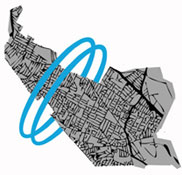
| Between February 2009 and December 2010, we spoke to hundreds of people about the future. A few dozen of these people were nice enough to make predictions about the future. Some of these predictions took the form of elaborate short stories, or intricate drawings or maps. Click on their names to see what these participants submitted to the project. (Note: to see these predictions in context, click on "Timeline & findings", above.)
|
Dear History of Somerville Team, We have enjoyed reading your historical account of Somerville, detailing the major events between 2010 and 2100. We found no faults within the listed facts, the text is well written, and the images are both illustrative and informative. However, we were surprised to find that you omitted one of the most prominent cultural and economic developments of the 2010's, namely, the belated rise to prominence of the legendary flatpick guitarist, Dan Crary and the return of Rounder Records to Somerville. Crary was a musical legend, a pioneer of one of the most intricate, yet powerful, forms of American music, and a master of the guitar; a flatpicking stylist with an international reputation for innovation, taste and brilliance. With more than 50 years as a performer by 2010, Crary was one of the few artists whose work could be said to transcend the boundaries of style and genre. Despite these talents, however, Crary eluded mainstream recognition until July 2011, when he selflessly agreed to perform for free at Jimmy Tingle's Off-Broadway Theatre for Somerville's Artbeat Festival . Owing to faults in the theatre's air-conditioning system (the date coincided with one of the most severe heatwaves of the early 2010's), the performance itself was a flop, but when a bootlegged video recording of this performance was uploaded to Youtube shortly after by an anonymous contributor, Crary was elevated overnight to the heights of international stardom, bringing the art of flatpicking guitar to the masses at last. Over the next decade, until his untimely death in the early 2020's, Crary would go on to produce seven full-length albums which would set the tone for popular music for the remainder of the century, and toured extensively worldwide, gaining critical acclaim not only throughout the west, but even in unlikely corners of the world such as India, North Korea and the Middle East. Although actually a native of Kansas, Crary's public image became inseprable from the city of Somerville, which hosted this ground-breaking performance, and, as it soon transpired, was also the original home of the record label Rounder Records, which had recorded his first solo album, "Lady's Fancy", all the way back in 1977 (cf. http://www.discogs.com/Dan-Crary-Ladys-Fancy/release/2149871 ). Crary's break triggered explosive sales of this back-numbered recording that would last for the remainder of the 2010's - a feat that boggled critics' minds after a decade dominated by illegal download of music. The intensity and longevity of Crary's record sales brought so much unanticipated revenue to Rounder, which during harder times had moved out to Burlington, MA, that by 2017, the label's finances had gained enough momentum to move its headquarters back to Somerville. After buying out the building that housed their original headquarters at 186 Willow Avenue, Rounder bosses Ken Irwin and Bill Nowlin made a career-defining decision. Instead of investing in a hoard of new and expensive artists, they assembled a team of young software engineers. Their mission was simple - to develop a failsafe method of eradicating illegal download of music on the Internet - a the task which major labels had struggled with for two decades without success. Against all odds, a breakthrough came in 2019, when a Tufts University student, working in the Rounder team as a summer intern, developed an algorithm that could probe and recognize audio waveforms stored in any digital format. Rounder dispatched billions of software robots equipped with this algorithm onto the Internet, and within twenty-three days had built up a database of all illegal download activity on the world-wide web, which could be continuously updated for the indefinite future, while providing access to the database to the FBI, the CIA, and copyright-law enforcement agencies worldwide. Rounder stocks skyrocketed overnight, and as a result, fresh capitol flowed into the company, which promptly invested in a state-of-the art computer farm capable of the gargantuan task of maintaining the music-theft database. A large plot of land facing the Charles River in Cambridge was purchased to house the facility, which requires several thousand tons of water per day to keep the massive processor array from overheating. After dodging a hostile takeover by Google in early 2020, Rounder proceeded to purchase the remains of formerly powerful major labels such as CBS/Sony, EMI and Virgin, cementing its position as the new superpower in the recorded music industry that it would maintain for the remainder of the century. We would strongly suggest adding some account of these events in your historical account of Somerville. Sincerely,
|